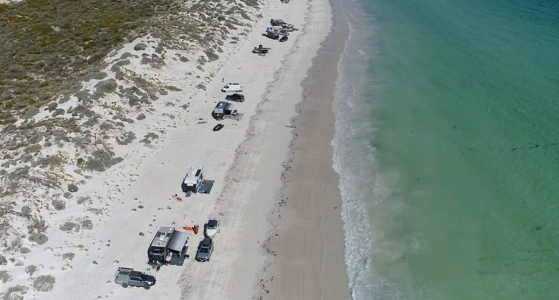Discover the Hidden Aussie Beach That Got Camping Banned: Are You Missing Out?
By
Gian T
- Replies 2
Australia is renowned for its stunning beaches, and for many Aussies, there's no better way to enjoy these natural wonders than by packing up the 4WD and heading out for a beach camping adventure. However, the increasing popularity of this pastime has led to significant environmental concerns, prompting authorities to take action at one of the country's beloved coastal spots.
Wauraltee Beach, a once 'secret' destination on the picturesque Yorke Peninsula in South Australia, has become the latest casualty in the battle between conservation and recreation. From 3 February 2025, overnight camping will no longer be permitted along its sandy shores, including the area known as Second Beach. This decision, made by the state's Department for Environment and supported by local councils and community leaders, aims to protect the sensitive coastal environment from the damage caused by mass congregations of vehicles.
The charm of Wauraltee Beach, with its pristine sands and clear waters, has not gone unnoticed. The rise of social media has turned many hidden gems into hotspots, as images and locations of these 'secret spots' are shared online, attracting large numbers of visitors. The increased popularity of off-road 4WD vehicles has exacerbated the issue, with more of them being driven on South Australian beaches, leading to problems for local ecosystems.
The government's move to ban camping is not an isolated incident. It reflects a growing trend across the country where authorities are grappling with the need to preserve fragile ecosystems. Many of these areas are already facing significant challenges such as erosion, littering, and pollution. The decision at Wauraltee Beach is a response to these challenges, balancing the desire for visitor enjoyment with the need to protect native flora and fauna.
Jason Irving, National Parks Programs Director for the National Parks and Wildlife Service, has clarified that there is 'no intention' to ban vehicles from all state beaches. The focus is on addressing the specific challenge of large camping vehicles that drive onto the beach to stay overnight in mass numbers. Daytime vehicle access will still be permitted for activities such as boating and fishing, ensuring that the beach remains a place for recreation while safeguarding its environmental values.
Safety concerns have also been raised due to the sheer volume of people and vehicles turning up to 4WD, particularly during holiday periods and long weekends. The environment department noted that the exponential growth in beach traffic creates risks, especially for families with young children.
The impact of vehicles on the beach is multifaceted. Wildlife, including shorebirds like the fairy tern, eastern curlew, hooded plover, and red knot, face habitat disruptions. In particular, vulnerable sand dunes suffer from vegetation and root system damage due to vehicle use, leading to sand drift and erosion. Cultural sites and artefacts are at risk of permanent damage, and vehicle tyres can introduce weed infestations. Furthermore, sand compaction from traffic affects the natural movement and distribution of the coastal ecosystem.
To ensure visitors are aware of the new regulations, new signage will be installed at Wauraltee Beach. Education is the government's first priority, with wardens instructed to be fair and reasonable when administering compliance.
 As we reflect on the changes at Wauraltee Beach, it's a reminder of the delicate balance between enjoying Australia's natural beauty and preserving it for future generations. While some may mourn the loss of a beloved camping spot, it's crucial to consider the long-term health of our environment. Have you visited Wauraltee Beach or other similar coastal areas? How do you feel about the camping ban? Share your thoughts and experiences with us, and let's discuss how we can all contribute to the sustainability of Australia's incredible beaches.
As we reflect on the changes at Wauraltee Beach, it's a reminder of the delicate balance between enjoying Australia's natural beauty and preserving it for future generations. While some may mourn the loss of a beloved camping spot, it's crucial to consider the long-term health of our environment. Have you visited Wauraltee Beach or other similar coastal areas? How do you feel about the camping ban? Share your thoughts and experiences with us, and let's discuss how we can all contribute to the sustainability of Australia's incredible beaches.
Wauraltee Beach, a once 'secret' destination on the picturesque Yorke Peninsula in South Australia, has become the latest casualty in the battle between conservation and recreation. From 3 February 2025, overnight camping will no longer be permitted along its sandy shores, including the area known as Second Beach. This decision, made by the state's Department for Environment and supported by local councils and community leaders, aims to protect the sensitive coastal environment from the damage caused by mass congregations of vehicles.
The charm of Wauraltee Beach, with its pristine sands and clear waters, has not gone unnoticed. The rise of social media has turned many hidden gems into hotspots, as images and locations of these 'secret spots' are shared online, attracting large numbers of visitors. The increased popularity of off-road 4WD vehicles has exacerbated the issue, with more of them being driven on South Australian beaches, leading to problems for local ecosystems.
The government's move to ban camping is not an isolated incident. It reflects a growing trend across the country where authorities are grappling with the need to preserve fragile ecosystems. Many of these areas are already facing significant challenges such as erosion, littering, and pollution. The decision at Wauraltee Beach is a response to these challenges, balancing the desire for visitor enjoyment with the need to protect native flora and fauna.
Jason Irving, National Parks Programs Director for the National Parks and Wildlife Service, has clarified that there is 'no intention' to ban vehicles from all state beaches. The focus is on addressing the specific challenge of large camping vehicles that drive onto the beach to stay overnight in mass numbers. Daytime vehicle access will still be permitted for activities such as boating and fishing, ensuring that the beach remains a place for recreation while safeguarding its environmental values.
Safety concerns have also been raised due to the sheer volume of people and vehicles turning up to 4WD, particularly during holiday periods and long weekends. The environment department noted that the exponential growth in beach traffic creates risks, especially for families with young children.
The impact of vehicles on the beach is multifaceted. Wildlife, including shorebirds like the fairy tern, eastern curlew, hooded plover, and red knot, face habitat disruptions. In particular, vulnerable sand dunes suffer from vegetation and root system damage due to vehicle use, leading to sand drift and erosion. Cultural sites and artefacts are at risk of permanent damage, and vehicle tyres can introduce weed infestations. Furthermore, sand compaction from traffic affects the natural movement and distribution of the coastal ecosystem.
To ensure visitors are aware of the new regulations, new signage will be installed at Wauraltee Beach. Education is the government's first priority, with wardens instructed to be fair and reasonable when administering compliance.
Key Takeaways
- Camping will be prohibited on Wauraltee Beach, including the Second Beach area, on the York Peninsula in South Australia, from 3 February 2025.
- The ban aims to protect the local ecosystems from damage caused by the increasing number of 4WD vehicles and mass congregations of campers.
- Daytime vehicle access for boat launching and other recreational activities will still be allowed to ensure enjoyment of the beach while protecting the environment.
- Environmental concerns include the impact on wildlife, sand dune vulnerability and cultural site preservation; safety issues due to high vehicle and people traffic are also noted.








